
Fiat Uno Manual
Carburettor (Weber 30/32 DMTR 90/250) - servicing and adjustmentFuel system / Carburettor (Weber 30/32 DMTR 90/250) - servicing and adjustment
1 The carburettor top cover with float may be removed without the need to withdraw the carburettor from the manifold. The other adjustments described in this Section will require removal of the carburettor.
2 Extract the top cover fixing screws and lift away the top cover with float. Access to the fuel inlet needle valve is as described in Section 9 paragraphs 4 and 5.
Float adjustment
3 Hold the cover vertically so that the floats
hang down under their own weight. Measure
the distance between the float and the surface
of the gasket on the top cover. This should be
between 6.75 and 7.25 mm (0.27 and 0.29 in).
4 Bend the float arm if necessary to adjust the setting.
Primary valve plate opening 5 With the throttle valve plate control lever in contact with the stop, the primary valve plate should be open (dimension X Fig. 3.22) between 6.45 and 6.95 mm (0.25 and 0.27 in).
If adjustment is required, carefully bend the lever stop.
Primary and secondary valve
plate openings
6 With the throttle control lever fully actuated
the valve plate gaps (X and Y Fig. 3.24) should
be:
X = 13.5 to 14.5 mm (0.53 to 0.57 in)
Y = 14.5 to 15.5 mm (0.57 to 0.61 in)
Fast idle
7 Close the choke valve plate fully and check
the gap (A) (Fig. 3.25) between the edge of the
throttle valve plate and the carburettor throat.
The gap should be between 0.90 and 0.95 mm (0.035 and 0.037 in), a twist drill is useful for measuring this.
8 If adjustment is required, carry this out using the screw and locknut.
Anti-flooding device
mechanically-operated)
9 With the choke control pulled fully out, it
should be possible to open the choke valve
plate to give a gap (X) of between 7.0 and
7.5 mm (0.28 and 0.30 in). If adjustment is
required, carefully bend the stop on the
control lever (Fig. 3.26).
Anti-flooding device (automatic) 10 Pull the choke control fully out and hold the control lever, on the anti-flooding device, depressed. There should be a gap (Y) (Fig. 3.27) between the edge of the choke valve plate and the carburettor wall of between 3.75 and 4.25 mm (0.15 and 0.17 in). If adjustment is required, turn the adjuster screw provided.
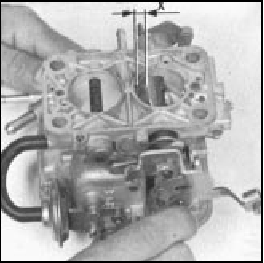
Fig. 3.22 Primary valve plate opening (Weber 30/32 DMTR 90/250) (Sec 14)
X = 6.45 to 6.95 mm (0.25 to 0.27 in)
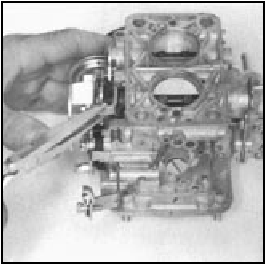
Fig. 3.23 Bending throttle lever stop (Weber 30/32 DMTR 90/250) (Sec 14)
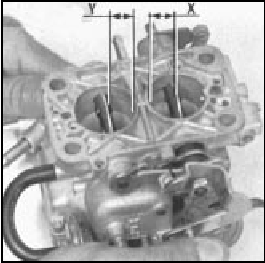
Fig. 3.24 Throttle valve plate openings (Weber 30/32 DMTR 90/250) (Sec 14)
X (primary) = 13.5 to 14.5 mm (0.53 to 0.57 in) Y (secondary) = 14.5 to 15.5 mm (0.57 to 0.61 in)
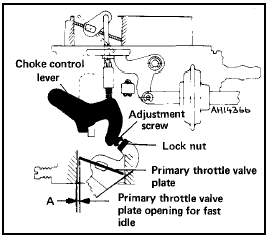
Fig. 3.25 Fast idle adjustment diagram (Weber 30/32 DMTR 90/250) (Sec 14)
A = 0.90 to 0.95 mm (0.035 to 0.037 in)
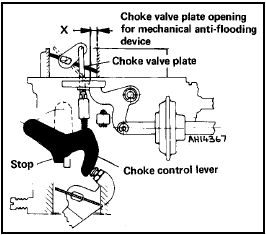
Fig. 3.26 Anti-flooding device (mechanical) adjustment diagram (Weber 30/32
DMTR 90/250) (Sec 14)
X = 7.0 to 7.5 mm (0.28 to 0.30 in)
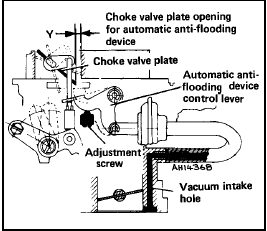
Fig. 3.27 Anti-flooding device (automatic) adjustment diagram (Weber 30/32
DMTR 90/250) (Sec 14)
Y = 3.75 to 4.25 mm (0.148 to 0.167 in)
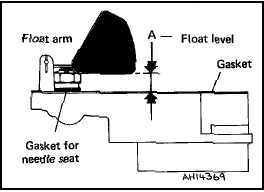
Fig. 3.28 Float setting diagram (Solex C30-32 CIC/1) (Sec 14)
A = 6.7 to 7.5 mm (0.26 to 0.30 in)






